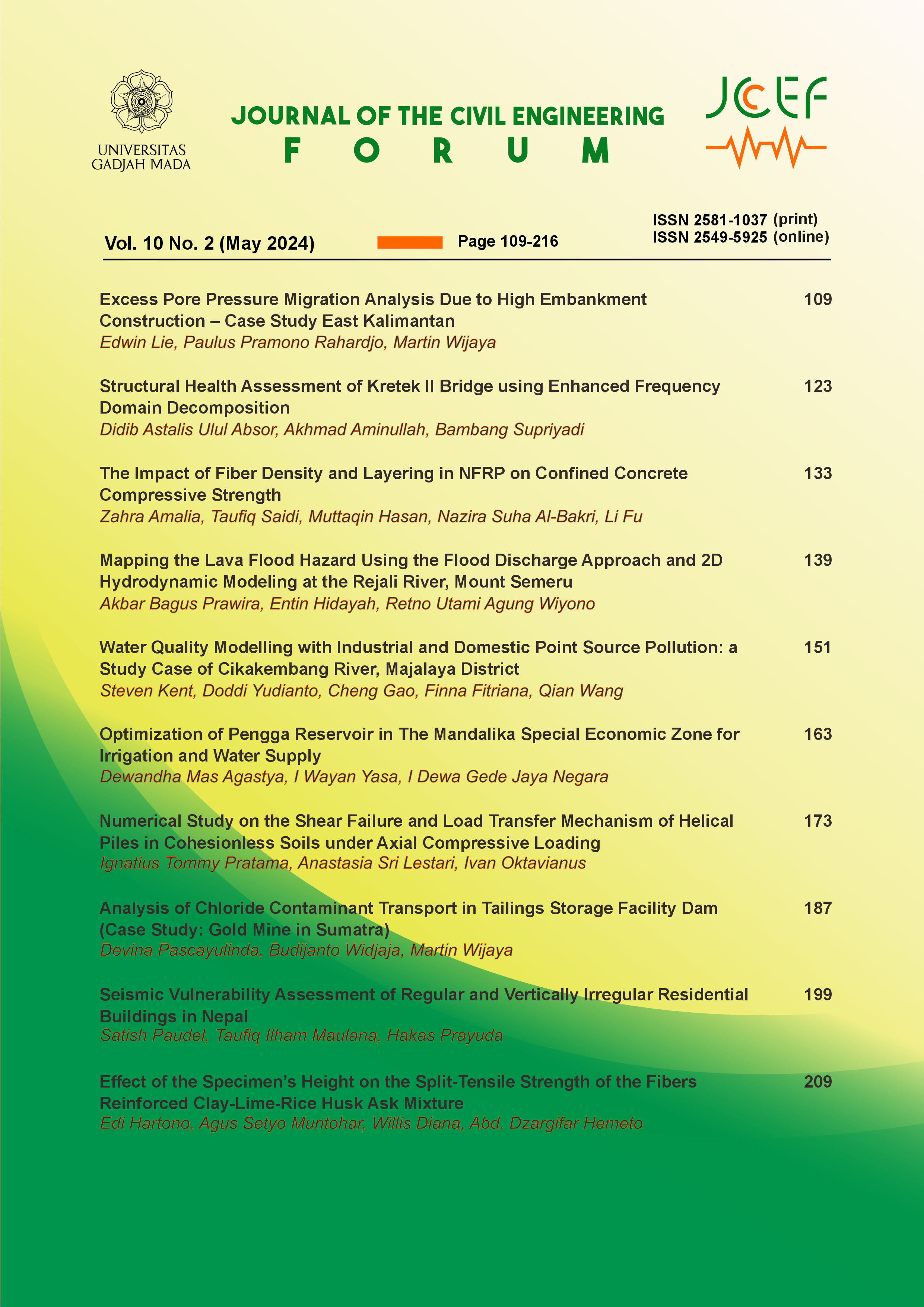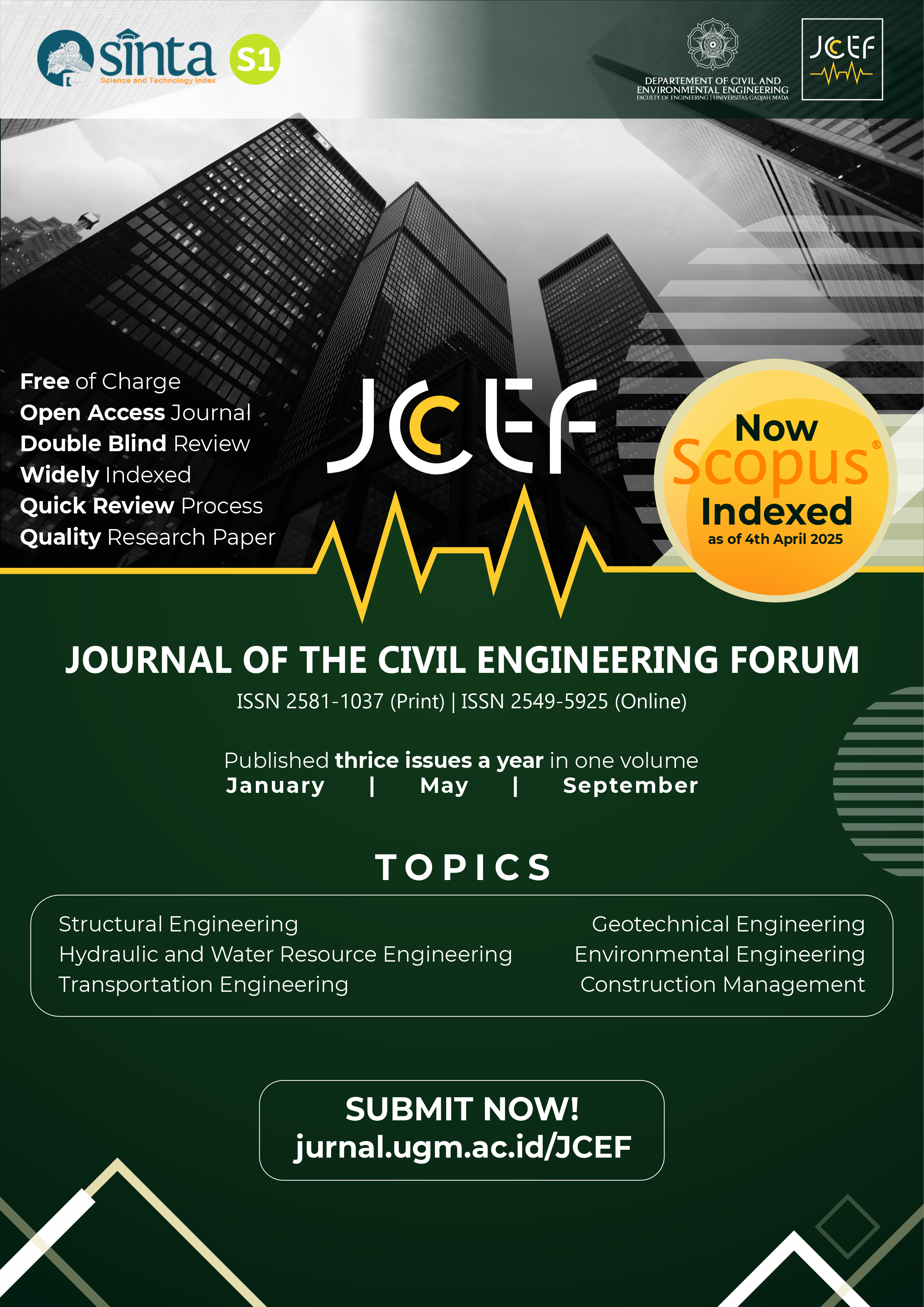Optimization of Pengga Reservoir in The Mandalika Special Economic Zone for Irrigation and Water Supply
Abstract
Mandalika Special Economic Zone is tourism area that is expected to improve the economy in West Nusa Tenggara Province. To support these activities, an allocation of domestic water needs of 200 liters second -1 is needed. The potential availability of water in the Pengga Reservoir is planned to be a source of domestic water needs in the Mandalika Special Economic Zone. Pengga Reservoir has an effective storage volume of 17.26 MCM. Potential water resources in Pengga Reservoir are obtained from reservoir outflow upstream and lateral inflow from several tributaries. The study was carried out to determine the reservoir storage capacity to meet domestic water needs and irrigation water needs covering an area 3189 ha. The cropping pattern used in the Pengga irrigation area is Paddy – Paddy/Secondary Crops – Paddy/Secondary Crops. To optimize the potential of water resources in the Pengga Reservoir, a linear programming optimization method is used. Indicators of the success of optimization calculations are indicated by the value of cropping intensity, k factor and reliability that have met the minimum limit value. The k factor value for irrigation water needs is 0.70 and domestic water needs is 0.85. Based on the optimization results, it is known the largest annual cropping intensity value occurs in the November I planting season. This conclusion can be seen from the comparison of annual cropping intensity values for the November I and November II planting schedules for the dry year inflow discharge scenario of 99.98% and 97.22% respectively. The cropping intensity value in the November I planting season is greater than November II, namely 100% and 97.25%, for the normal year discharge inflow scenario. This study provides an information for policy makers can use the November I planting schedule to obtain values for maximum cropping intensity and domestic water requirements.
References
Agastya, D. M. (2022), Optimasi operasi waduk kaskade batujai dan pengga di pulau lombok, Master thesis report, Department of Civil and Environmental Engineering, Universitas Gadjah Mada, Yogyakarta.
Agastya, D. M., Jayadi, R. and Istiarto (2023), Optimum water utilization of a cascade reservoirs: Case study of Batujai and Pengga Reservoirs in Central Lombok District, West Nusa Tenggara Province, in ‘4th International Conference on Sustainable Infrastructure’, Vol. 2629 of AIP Conf. Proc., pp. 060013–1–060013–10. URL: https://doi.org/10.1063/5.0128877
Azamathulla, H. M., Ghani, A. A., Zakaria, N. A. and Kiat, C. C. (2009), Linear programming approach for irrigation scheduling – a case study, in ‘14th MANCO’.
Digna, R. F. M. O. (2021), Optimizing the operation of a multiple reservoir system in the Eastern Nile Basin considering water and sediment fluxes, in ‘Optimizing the Operation of a Multiple Reservoir System in the Eastern Nile Basin Considering Water and Sediment Fluxes’. URL: https://doi.org/10.1201/9781003097792
Fang, H. B., Hu, T. S., Zeng, X. and Wu, F. Y. (2014), ‘Simulation-optimization model of reservoir operation based on target storage curves’, Water Science and Engineering 7(4), 433–445. URL: https://doi.org/10.3882/j.issn.1674-2370.2014.04.008
Farriansyah, A. M., Juwono, P. T., Suhartanto, E. and Dermawan, V. (2018), ‘Water allocation computation model for river and multi-reservoir system with sustainability-efficiency-equity criteria’, Water (Switzerland) 10(11). URL: https://doi.org/10.3390/w10111537
Ginting, B. M., Harlan, D., Taufik, A. and Ginting, H. (2017), ‘Optimization of reservoir operation using linear program, case study of Riam Jerawi Reservoir, Indonesia’, International Journal of River Basin Management 15(2), 187–198. URL: https://doi.org/10.1080/15715124.2017.1298604
Heydari, M., Othman, F. and Qaderi, K. (2015), ‘Developing optimal reservoir operation for multiple and multipurpose reservoirs using mathematical programming’, Mathematical Problems in Engineering 2015(February). URL: https://doi.org/10.1155/2015/435752
Heydari, M., Othman, F., Qaderi, K., Noori, M. and Shahiriparsa, A. (2015), ‘Introduction to linear programming as a popular tool in optimal reservoir operation, a review’, Advances in Environmental Biology 9(3), 906–917. URL: http://dx.doi.org/10.5281/zenodo.18254
Jamil, F. F. S., Darsono, S. and Suharyanto (2019), ‘Optimization of logung reservoir performance’, IOP Conference Series: Earth and Environmental Science 328(1). URL: https://doi.org/10.1088/1755-1315/328/1/012017
Jayadi, R., Azis, A. and Hartini, R. K. (2019), ‘Multi criteria irrigation water allocation for’, 2, 1–7.
Li, X., Huo, Z. and Xu, B. (2017), ‘Optimal allocation method of irrigation water from river and lake by considering the field water cycle process’, Water (Switzerland) 9(12). URL: https://doi.org/10.3390/w9120911
Long Le Ngo, A. (2007), ‘case study of the Hoa Binh reservoir, Vietnam Ph. D’.
Maliwal, S., Murmu, M., Yadu, L. K. and Verma, M. K. (2019), ‘Multi-reservoir flood control operation by optimization technique: A review’, International Journal of Engineering Research Technology 8(08), 681–685.
Mboyerwa, P. A., Kibret, K., Mtakwa, P. and Aschalew, A. (2022),‘Lowering nitrogen rates under the system of rice intensification enhanced rice productivity and nitrogen use efficiency in irrigated lowland rice’, Heliyon 8(3), e09140. URL: https://doi.org/10.1016/j.heliyon.2022.e09140
Mehta, D., Achour, B., Pastagia, J., Azamathullah, H. and Verma, S. (2023), ‘Review of reservoir operation’, Larhyss Journal 56, 193–214.
Nandalal, K. D. W. and Bogardi, J. J. (2007), ‘Dynamic programming based operation of reservoirs: Applicability and limits’, Dynamic Programming Based Operation of Reservoirs: Applicability and Limits (9780521874(January)), 1–130. URL: https://doi.org/10.1017/CBO9780511535710
Qomah, N. I., Budianto, M. B. and Hanifah, L. (2018), Simulasi tampungan waduk Bendungan Pengga untuk pemenuhan kebutuhan air irigasi di daerah irigasi Bendungan Pengga, Skripsi, Jurusan Teknik Sipil, Fakultas Teknik, Universitas Mataram.
Raju, B. C. K., Gowda C, C. and B S, K. (2020),‘Optimization of reservoir operation using linear programming’, International Journal of Recent Technology and Engineering (IJRTE) 8(5), 1028–1032. URL: https://doi.org/10.35940/ijrte.e6174.018520
Rediasti, F. N. K., Jayadi, R. and Triatmodjo, B. (2023), ‘Optimizing the use of Meninting multipurpose reservoir water in West Lombok District’, Journal of the Civil Engineering Forum 9(2).
Samosir, C. S., Soetopo, W. and Yuliani, E. (2015), ‘Optimasi pola operasi waduk untuk memenuhi kebutuhan energi pembangkit listrik tenaga air ( studi kasus Waduk Wonogiri )’, Jurnal Teknik Pengairan 6(1), 108–115.
Thomas, T., Ghosh, N. C. and Sudheer, K. P. (2021),‘Optimal reservoir operation – a climate change adaptation strategy for Narmada basin in central India’, Journal of Hydrology 598(March 2020), 126238. URL: https://doi.org/10.1016/j.jhydrol.2021.126238
Turner, S. W. D., Steyaert, J. C., Condon, L. and Voisin, N. (2021), ‘Water storage and release policies for all large reservoirs of conterminous United States’, Journal of Hydrology 603(PA), 126843. URL: https://doi.org/10.1016/j.jhydrol.2021.126843
US Army Corps of Engineers (1991), Optimization of Multiple-Purpose Reservoir System Operations: A Review of Modeling and Analysis Approaches, number 34 in ‘Research Document’.
Wang, K., Davies, E. G. R. and Liu, J. (2019), ‘Integrated water resources management and modeling: A case study of Bow river basin, Canada’, Journal of Cleaner Production 240, 118242. URL: https://doi.org/10.1016/j.jclepro.2019.118242
Wesli (2015), ‘Operation planning reservoir with linear programming optimization model for water demand of the community in aceh besar district’, Indonesian Journal of Geography 47(1), 99–106. URL: https://doi.org/10.22146/ijg.6750
Xu, C. and Zhang, D. (2018), ‘Impact of the operation of cascade reservoirs in upper yangtze river on hydrological variability of the mainstream’, Proceedings of the International Association of Hydrological Sciences 379(2008), 421–432. URL: https://doi.org/10.5194/piahs-379-421-2018
Yasa, I. W., Agastya, D. M. and Sulistiyono, H. (2023), ‘Comparison of cropping intensity in conventional and SRI irrigation water delivery system at Batu Bulan reservoir’, Advanced Engineering Science / Gongcheng Kexue Yu Jishu 55(03).
Yekti, M. I. (2017), Role of reservoir operation in sustainable water supply to subak irrigation schemes in Yeh Ho river basin, in ‘Role of Reservoir Operation in Sustainable Water Supply to Subak Irrigation Schemes in Yeh Ho River Basin’. URL: https://doi.org/10.1201/9781315116310
Zhou, W., Yang, Z., Liu, P., Bai, F. and Zheng, C. (2019), ‘Estimation of reservoir inflow with significant lateral inflow by using the adjoint equation method’, Journal of Hydrology 574(April), 360–372. URL: https://doi.org/10.1016/j.jhydrol.2019.04.047
Copyright (c) 2024 The Author(s)

This work is licensed under a Creative Commons Attribution-ShareAlike 4.0 International License.
Copyright is granted to authors for the purpose of providing protection for articles written to describe experiments and their results. JCEF will protect and defend the work and reputation of the author and are also willing to address any allegations of violation, plagiarism, fraud, etc. against articles written and published by JCEF. JCEF is published under the terms of the Creative Commons Attribution-ShareAlike 4.0 International License (CC BY-SA 4.0). The author holds the copyright and assigns the journal rights to the first publication (online and print) of the work simultaneously.







